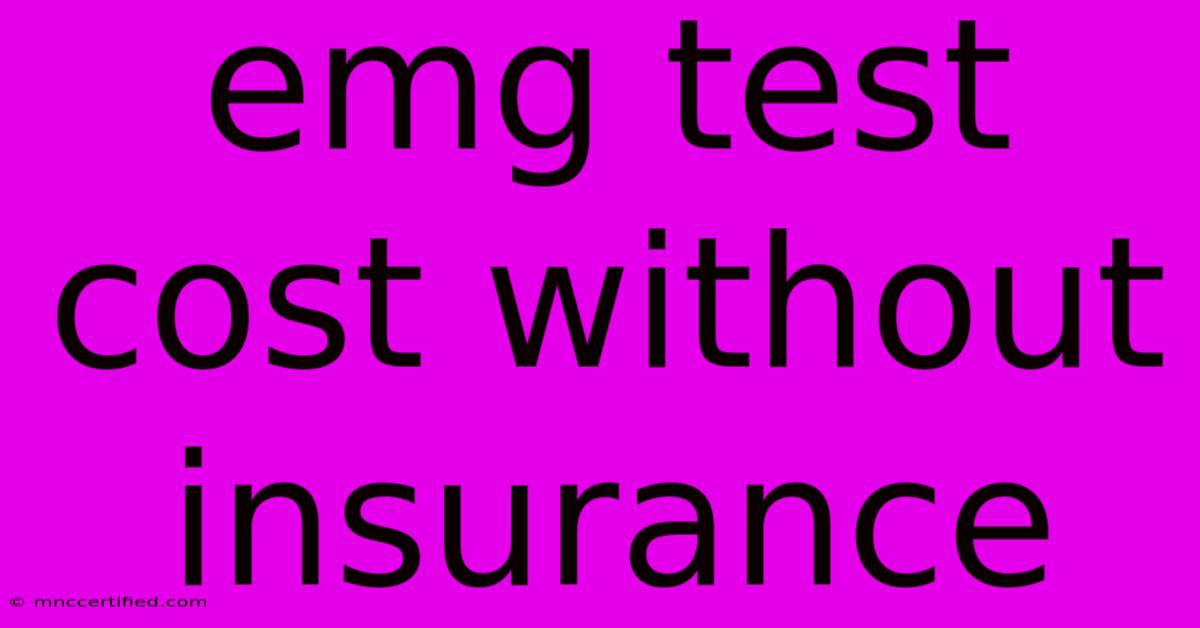Emg Test Cost Without Insurance

Table of Contents
EMG Test Cost Without Insurance: A Comprehensive Guide
Electromyography (EMG) tests are crucial for diagnosing various neuromuscular conditions. However, the cost of an EMG test without insurance can be a significant concern for many individuals. This guide provides a comprehensive overview of the factors influencing the price and strategies for managing the expense.
Understanding the Cost of an EMG Test Without Insurance
The cost of an EMG test without insurance varies widely depending on several factors:
- Geographic Location: Costs differ significantly across states and even within the same city. Urban areas tend to have higher costs than rural areas.
- Facility Type: The type of facility conducting the test (hospital, clinic, or independent diagnostic center) directly impacts the price. Hospitals generally charge more than other facilities.
- Specific Tests Performed: An EMG test might involve multiple procedures, such as nerve conduction studies (NCS), which can increase the overall cost. The complexity and duration of the testing will influence the billing.
- Physician Fees: The neurologist or physician interpreting the results will also charge a separate fee.
Estimating the Cost: Without insurance, you can expect to pay anywhere from $1,000 to $3,000 or more for a complete EMG and NCS test. This is a broad estimate, and you should contact local facilities for precise pricing in your area.
Finding Affordable EMG Testing Options
Navigating the cost of healthcare without insurance can be challenging. Here are some strategies to find more affordable EMG testing:
1. Contact Multiple Facilities for Price Quotes:
Directly contacting several clinics, hospitals, and independent diagnostic testing centers in your area is crucial. Compare their pricing and services to find the best value. Don't hesitate to negotiate if possible.
2. Consider Discounted Care Programs:
Many hospitals and clinics offer financial assistance or discounted care programs for uninsured or low-income individuals. Inquire about these options during your initial contact.
3. Explore Payment Plans:
Some facilities may offer payment plans to help manage the cost of the test. This could involve spreading the payments over several months, reducing the financial burden.
4. Check for Free or Low-Cost Clinics:
Community health centers and free clinics in your area might offer EMG testing at significantly reduced rates or even for free, depending on your income and circumstances. These clinics often cater to underserved populations.
5. Negotiate the Price:
While not always possible, politely negotiating the price with the facility's billing department is worth considering. Explain your financial situation and explore potential discounts.
6. Research Financial Assistance Programs:
Organizations such as the Patient Advocate Foundation can provide guidance and resources for navigating healthcare costs and accessing financial assistance programs.
Preparing for Your EMG Test
Before undergoing an EMG, it's essential to:
- Understand the Procedure: Thoroughly familiarize yourself with the test's process, potential risks, and what to expect.
- Discuss Your Medical History: Provide a complete medical history to your doctor to ensure accurate diagnosis and treatment.
- Prepare for the Test: Follow your doctor's instructions regarding medication, food, and clothing.
- Ask Questions: Don't hesitate to ask your doctor or the facility staff any questions you may have.
Conclusion: Managing the Cost of an EMG Test
The cost of an EMG test without insurance can be substantial. However, by employing the strategies outlined above, you can increase your chances of finding more affordable testing options and managing the financial implications. Proactive research, comparison shopping, and communication are key to navigating this process effectively. Remember to prioritize your health and seek the necessary medical care while exploring all avenues to minimize costs.

Thank you for visiting our website wich cover about Emg Test Cost Without Insurance. We hope the information provided has been useful to you. Feel free to contact us if you have any questions or need further assistance. See you next time and dont miss to bookmark.
Featured Posts
-
Barbara Taylor Bradford Death At 91
Nov 26, 2024
-
Insurance For Stay At Home Moms
Nov 26, 2024
-
Ucl Predicted Lineups Matchday 5
Nov 26, 2024
-
Listeners Slam Band Aid 40 Remake
Nov 26, 2024
-
Commercial Auto Insurance Idaho
Nov 26, 2024